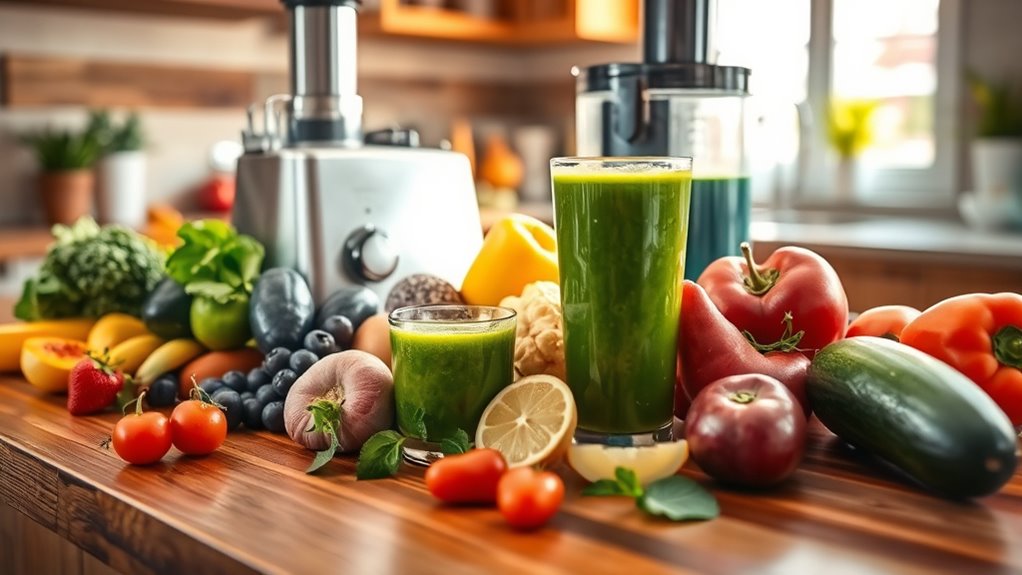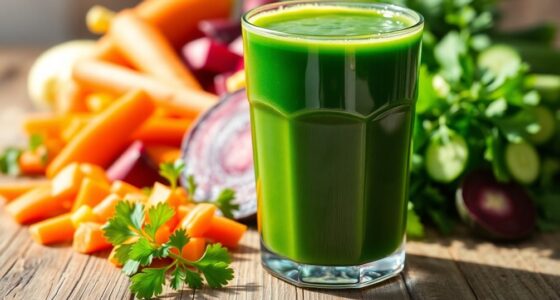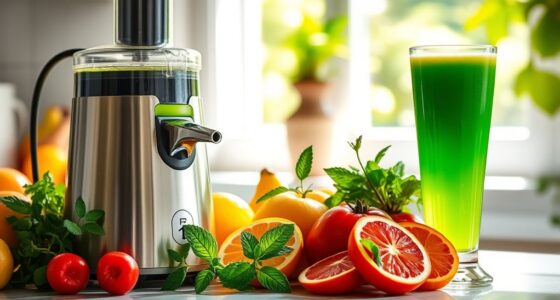Juicing’s hidden power for stress relief lies in its nutrient-rich ingredients that boost your mood and combat anxiety. Packed with antioxidants, vitamins, and minerals, these juices can enhance your well-being by fighting oxidative stress and regulating neurotransmitters. For instance, magnesium from leafy greens can help ease anxiety, while B vitamins and zinc are essential for emotional stability. By incorporating fresh juices into your routine, you can discover effective ways to support your mental health. There’s more to uncover about how juicing can transform your life!
Key Takeaways
- Juicing provides essential nutrients like antioxidants and magnesium, which help reduce stress and improve mood.
- Diets high in fruits and vegetables are linked to lower levels of anxiety and depression.
- Antioxidants from juices combat oxidative stress, promoting better emotional well-being and cognitive function.
- B vitamins and zinc in juices support neurotransmitter production, essential for maintaining emotional stability.
- Specific juice recipes, like Green Calm and Citrus Sunshine, enhance stress relief through their nutrient-rich ingredients.
The Science Behind Juicing and Mental Health
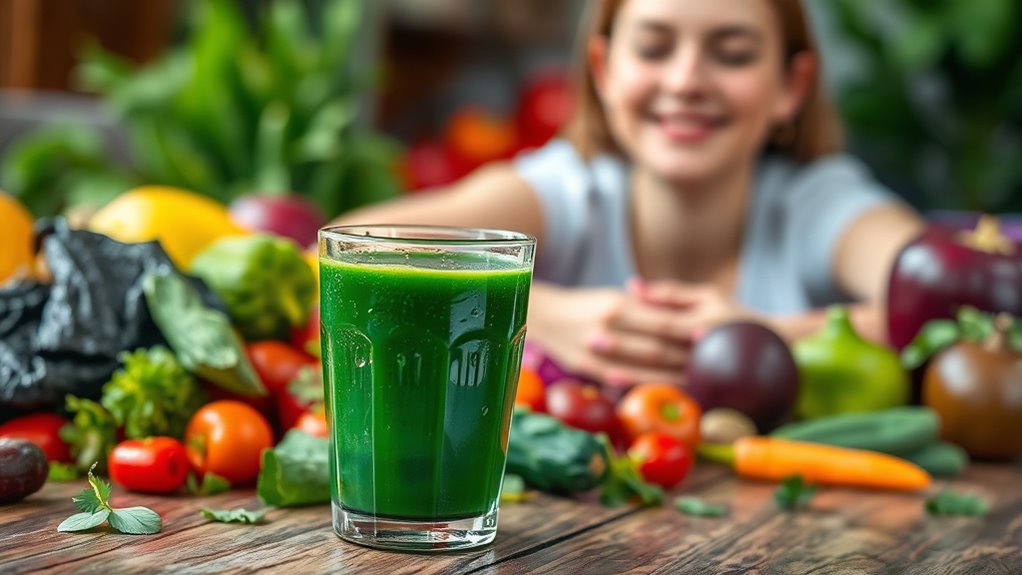
When you turn to juicing as a way to manage stress, you’re tapping into a powerful source of nutrients that can boost your mental health.
Recent studies show that diets rich in fruits and vegetables—often achieved through juicing—are linked to lower stress and depressive symptoms. The antioxidants in juice fight oxidative stress, which is closely tied to anxiety and depression.
Plus, magnesium from leafy greens supports your body’s stress response by regulating the hypothalamic-pituitary-adrenal (HPA) axis. Incorporating a variety of juiced fruits and vegetables not only enhances your mood but also improves cognitive function. Furthermore, the anti-inflammatory properties of celery juice can further contribute to reducing stress levels and promoting overall mental well-being.
Essential Nutrients for Stress Relief
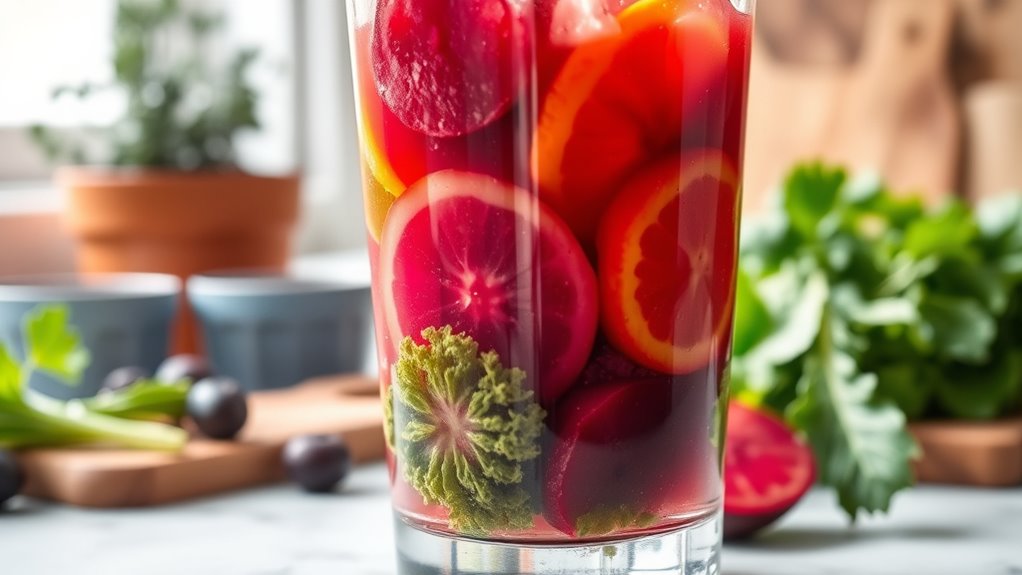
When it comes to stress relief, the nutrients in your juice can make a real difference.
Antioxidants from berries and leafy greens boost your mood by fighting oxidative stress, while magnesium helps regulate your body’s stress response.
Adding these essential nutrients to your diet can lead to a calmer, more balanced state of mind. Additionally, juices like beet juice may enhance blood flow, which can further support your overall well-being during stressful times.
Antioxidants for Mood Enhancement
Antioxidants are essential for boosting your mood and mental well-being, especially since they combat oxidative stress linked to anxiety and depression. Diets rich in antioxidants, like those found in colorful fruits and vegetables, can markedly lower depressive symptoms.
Common antioxidants such as vitamin C, vitamin E, and flavonoids reduce inflammation and oxidative damage in the brain, promoting a healthier mental state. A 2023 study revealed that people with higher antioxidant intake reported lower stress and depression levels.
One of the best ways to reap the benefits of juicing is by incorporating antioxidant-rich juices, like beet and strawberry juice. These delicious blends not only satisfy your taste buds but also provide mood-enhancing nutrients to support your mental health. Additionally, consuming freshly squeezed juices can maximize nutrient retention and enhance overall health benefits.
Magnesium’s Role in Stress
Magnesium is a powerhouse mineral that plays an essential role in managing stress and promoting mental well-being. It regulates the hypothalamic-pituitary-adrenal (HPA) axis, important for your body’s stress response.
If you want to harness magnesium’s benefits, consider these four aspects:
- Reduces Anxiety: Low magnesium levels can increase anxiety and depression symptoms.
- Boosts Mood: It’s essential for synthesizing neurotransmitters like serotonin, which enhance emotional well-being.
- Enhances Stress Response: Supplementation can improve your stress response, especially alongside antidepressants.
- Supports a Healthy Diet: Whole foods rich in magnesium, like leafy greens and nuts, promote better stress management.
Incorporating magnesium into your diet can make a significant difference in handling stress effectively. Additionally, fresh ingredients in homemade fruit juices can provide a natural source of magnesium, further supporting your stress relief efforts.
The Role of Antioxidants in Reducing Anxiety
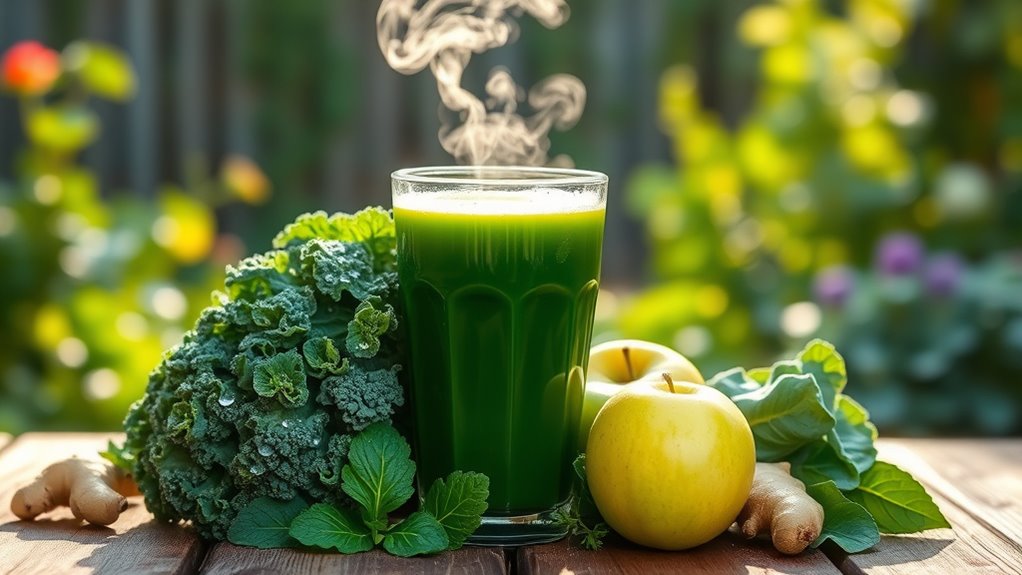
Antioxidants are key players in boosting your brain health and can greatly reduce anxiety.
By incorporating antioxidant-rich foods like fruits and vegetables into your diet, you can combat oxidative stress and improve your mood.
Juicing is a great way to easily access these nutrients and support your mental well-being. Additionally, green juice is high in vitamins that promote immune health and overall wellness.
Antioxidants and Brain Health
While many factors contribute to mental health, the role of antioxidants in reducing anxiety can’t be overlooked. These powerful compounds, abundant in fruits and vegetables, help combat oxidative stress linked to anxiety and mood disorders.
Consider the benefits of incorporating antioxidants into your diet:
- Combat oxidative stress, protecting your brain from damage.
- Enhance brain function, leading to clearer thinking and improved focus.
- Support emotional well-being, helping to stabilize your mood.
- Lower anxiety symptoms, promoting a sense of calm.
Regularly consuming antioxidant-rich foods, like those in juicing, can make a significant impact on your mental health. Additionally, a vegetarian diet that includes a variety of fruits and vegetables can further boost your intake of these essential compounds.
Dietary Sources of Antioxidants
Incorporating a variety of antioxidant-rich foods into your diet can greatly enhance your mental health and well-being. Antioxidants, primarily found in fruits and vegetables, combat oxidative stress linked to anxiety and depression. Diets like the Mediterranean, rich in these nutrients, show lower depressive symptoms, highlighting their protective effects.
Here’s a quick look at some excellent sources of antioxidants:
| Food | Antioxidant Content |
|---|---|
| Berries | High |
| Dark Chocolate | Moderate |
| Nuts | High |
| Leafy Greens | High |
Regularly consuming these foods can improve brain function and mood regulation. A recent study even found fewer anxiety symptoms in those with higher antioxidant intake. Additionally, ensuring a balanced diet rich in essential fatty acids is vital for overall mental health and can further support stress relief.
How Magnesium Supports Mood Regulation
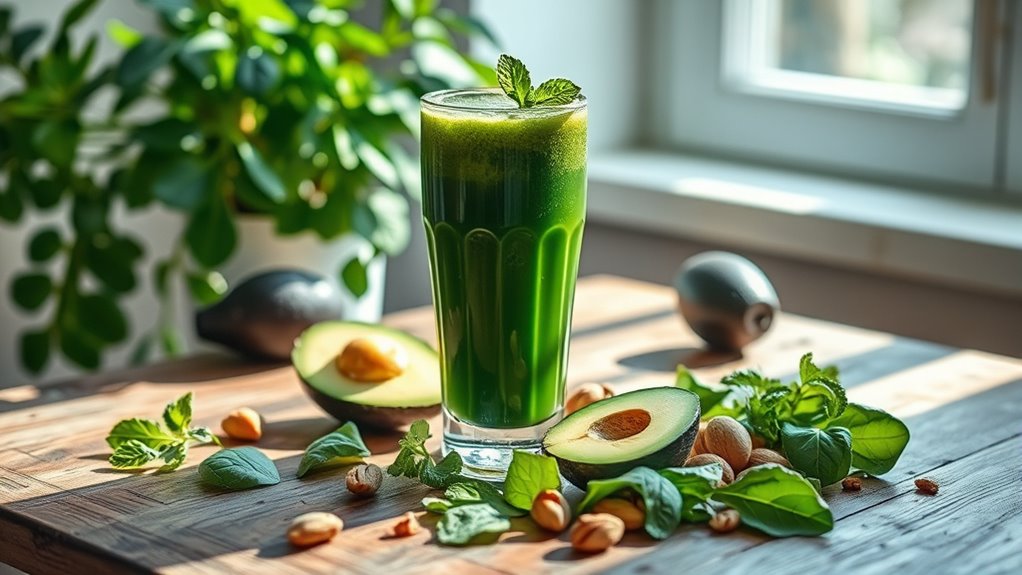
Mood regulation is deeply intertwined with our body’s mineral balance, and magnesium stands out as a key player. This essential mineral influences neurotransmitter systems crucial for emotional stability.
Here’s how magnesium supports mood regulation:
- Balances Neurotransmitters: It affects serotonergic, noradrenergic, and dopaminergic pathways.
- Reduces Anxiety: Low magnesium intake links to heightened anxiety levels and depression risks.
- Supports Stress Response: Magnesium deficiency disrupts the HPA axis, worsening stress reactions.
- Enhances Treatments: Increasing magnesium intake can improve anxiety and depression symptoms, especially with traditional treatments.
Incorporating magnesium-rich foods like leafy greens, nuts, seeds, and whole grains into your juices can markedly boost your mood and help combat anxiety. Additionally, low magnesium intake is associated with heightened anxiety and depression risks, emphasizing the importance of maintaining adequate levels for emotional well-being.
The Benefits of B Vitamins for Emotional Well-being

B vitamins, especially B6, B9 (folate), and B12, are crucial for your emotional well-being, as they directly contribute to the production of neurotransmitters like serotonin and dopamine.
A deficiency in these essential nutrients can lead to symptoms of anxiety and depression, underscoring their importance in mental health. When you guarantee adequate intake of B vitamins, studies show you’re likely to experience lower levels of depression and anxiety.
B12 supplementation, in particular, has been linked to improved mood in those who are deficient. Additionally, B vitamins support energy production and help reduce fatigue, making it easier to manage stress. Incorporating foods rich in B vitamins into your juicing recipes can enhance your emotional resilience and overall mental health. Furthermore, maintaining a low carb lifestyle can also contribute positively to your mood and stress levels.
Vitamin C: A Natural Stress Fighter
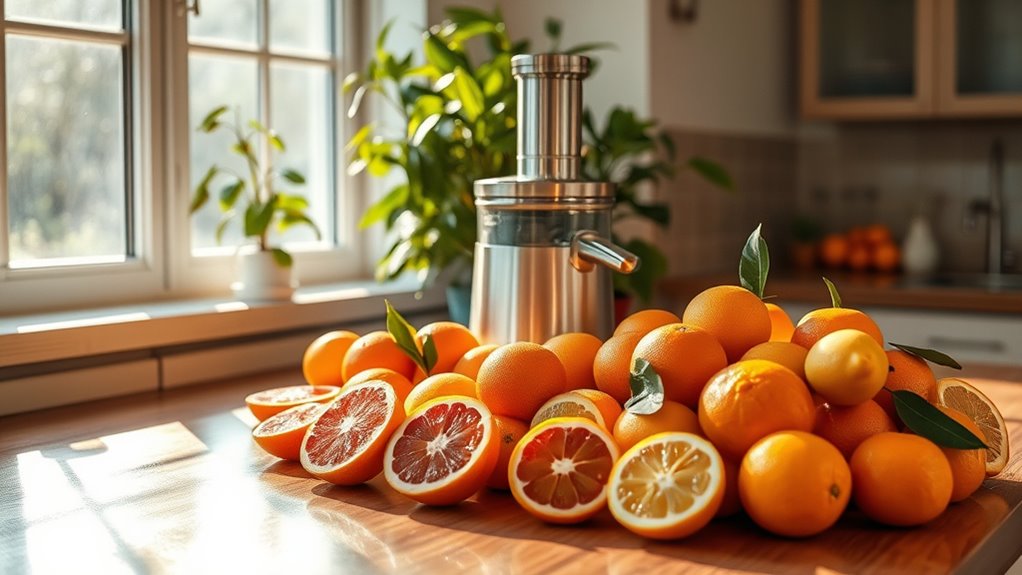
Vitamin C is a powerful ally in your battle against stress. By lowering cortisol levels and improving mood, it helps your body handle stress more effectively.
Incorporating citrus fruits into your juices not only boosts your vitamin C intake but also adds an invigorating flavor that supports your emotional well-being. Additionally, combining your citrus juices with chia seeds can enhance their nutritional profile, providing added fiber and omega-3 fatty acids for overall health.
Role of Vitamin C
Stress can take a toll on your mental well-being, but incorporating vitamin C into your diet might just help. This powerful nutrient plays an essential role in combating stress by:
- Supporting neurotransmitter production, like serotonin, to regulate your mood.
- Lowering cortisol levels, which are linked to stress responses.
- Reducing feelings of anxiety and depression when you maintain adequate levels.
- Enhancing recovery from stressful situations, helping you bounce back faster.
Citrus Fruits Benefits
When it comes to fighting stress, citrus fruits offer a delicious and effective solution. Rich in vitamin C, these fruits help lower cortisol levels, combating stress and enhancing your health. Regular consumption boosts your immune system, preventing stress-induced immune suppression. Studies show that those who eat more vitamin C from fruits experience less psychological stress and improved mood. Plus, citrus fruits contain flavonoids, which protect against oxidative stress and can enhance cognitive function.
| Benefit | Description |
|---|---|
| Lowers Cortisol | Reduces stress hormone levels |
| Boosts Immunity | Prevents stress-induced immune suppression |
| Enhances Mood | Improves psychological well-being |
| Protects Brain Health | Guards against oxidative stress effects |
Incorporate these fruits into your diet for better mental health!
Zinc and Its Impact on Mental Health
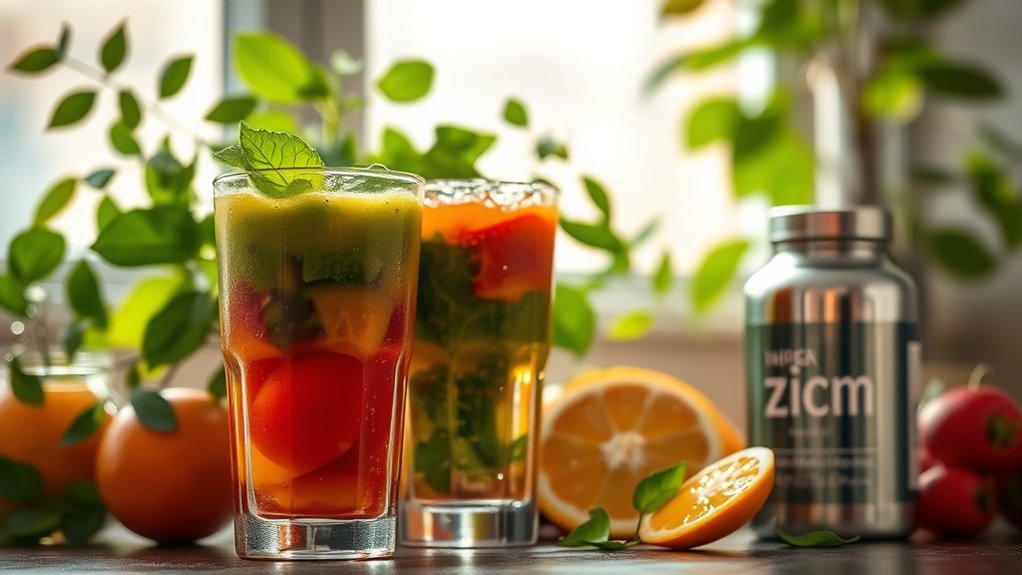
Although often overlooked, zinc plays an essential role in mental health, influencing brain function and mood regulation. Low levels of zinc can lead to increased anxiety and depression symptoms.
Here’s how zinc impacts your mental well-being:
- Neurogenesis: Zinc deficiency can impair the growth of new neurons, affecting cognitive function.
- Mood Regulation: It helps regulate neurotransmitters like serotonin and dopamine, vital for emotional stability.
- Supplementation: Zinc supplementation may enhance mood and reduce anxiety in those deficient.
- Anti-inflammatory Properties: Zinc’s anti-inflammatory properties can protect the brain from stress-related damage.
Incorporating zinc-rich foods like legumes, nuts, seeds, and whole grains into your diet can support your mental health and promote overall well-being.
Juicing Recipes to Combat Stress
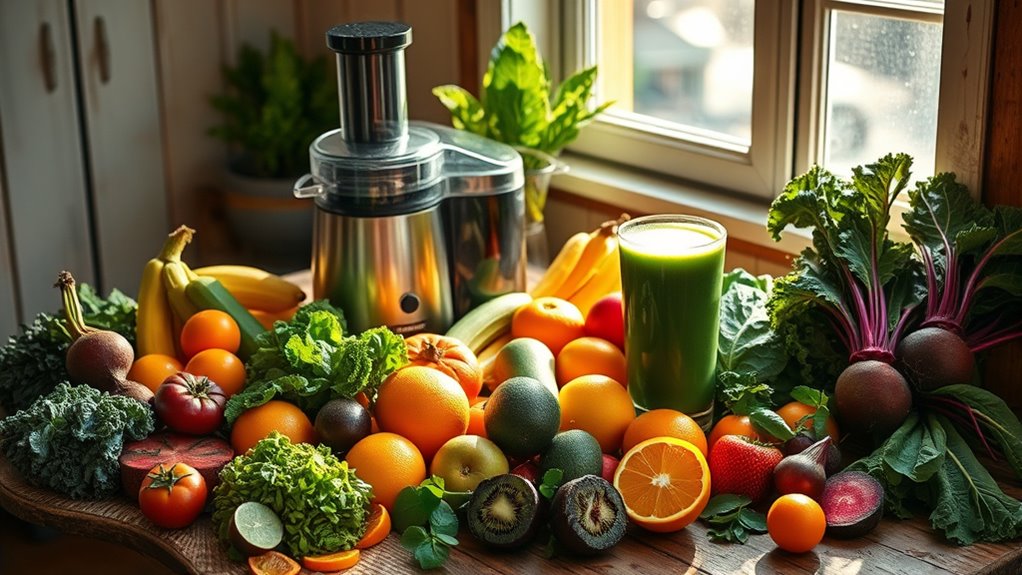
Juicing can be a powerful tool for alleviating stress and boosting your mood.
Try the Green Calm Juice, made with spinach, cucumber, and a green apple. It’s rich in magnesium, which helps stabilize blood sugar and reduce cortisol production.
Another great option is Citrus Sunshine Juice, combining oranges, carrots, and turmeric to deliver a rejuvenating dose of vitamin C, known for lowering cortisol levels.
For an afternoon boost, the Beet Bliss Juice, featuring beets, strawberries, and ginger, offers antioxidants that improve blood flow to the brain.
These juicing recipes showcase the potential benefits of incorporating a variety of fruits and vegetables, ensuring you get essential nutrients that support mental health and combat anxiety and depression symptoms effectively.
Incorporating Juicing Into Your Daily Routine
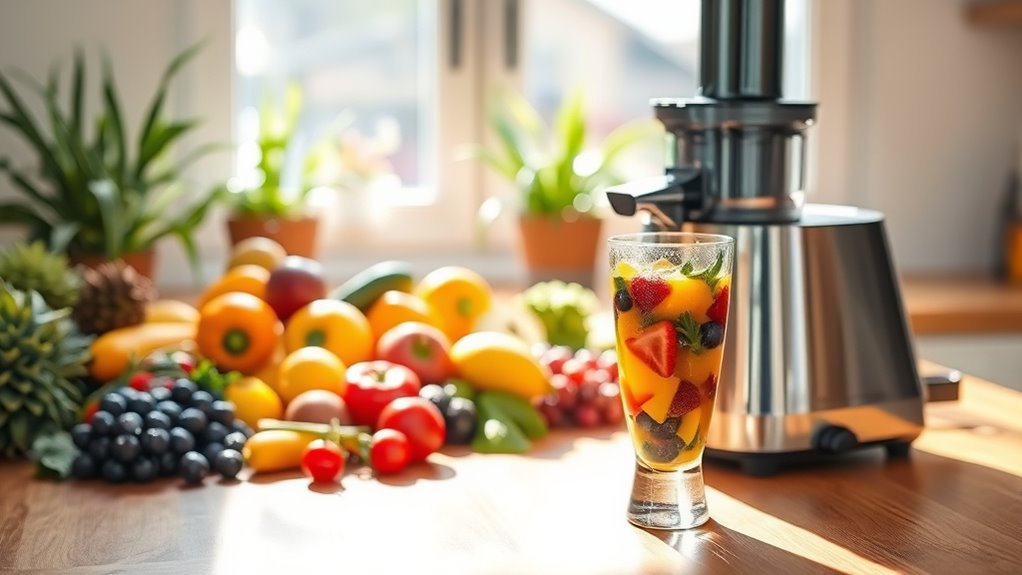
Incorporating juicing into your daily routine can be a game-changer for managing stress. To get started, consider these simple steps:
- Start your day with a nutrient-rich juice like Green Calm Juice, which combines spinach, cucumber, and green apple.
- Aim for at least one serving of juice daily, as studies suggest a high intake of fruits and vegetables is linked to lower stress.
- Experiment with different recipes such as Citrus Sunshine Juice or Beet Bliss Juice for a variety of nutrients.
- Balance your juices by mixing vegetables with fruits to maximize health benefits without excessive sugars.
With these foods to add, you’ll not only enjoy delicious flavors but also support your journey toward stress relief.
Personal Success Stories With Juicing for Stress Relief

Many people have found that embracing juicing leads to remarkable improvements in their stress levels and overall well-being.
For instance, many individuals rave about the Green Calm Juice, made with spinach, cucumber, and green apple, which helps reduce cortisol and promotes relaxation. Users often share how this simple addition to their routine has led to better sleep and increased energy, making them feel more resilient against daily stressors.
They’ve also noted that juicing enhances their mental clarity and supports healthier eating habits, without concerns about weight gain.
While it’s essential to seek medical advice when addressing stress, these success stories highlight how combining juicing with traditional therapies can yield significant benefits for mental health.
Frequently Asked Questions
What Juice Is Good for Stress Relief?
If you’re looking for juice that helps with stress relief, try Green Calm Juice. It’s packed with spinach, cucumber, and green apple, which can lower cortisol and stabilize blood sugar.
Citrus Sunshine Juice is another great option, as the vitamin C from oranges and turmeric helps balance your mood.
Don’t forget Beet Bliss Juice, too; it boosts blood flow and delivers antioxidants to combat stress.
Incorporating these juices into your routine can really make a difference!
Does Juicing Help With Anxiety?
Yes, juicing can help with anxiety. When you incorporate nutrient-rich juices into your diet, you’re providing your body with essential vitamins and minerals that support brain health and hormonal balance.
Ingredients like magnesium and B vitamins found in juices play key roles in regulating mood. By drinking juices like Green Calm Juice or Citrus Sunshine Juice, you can combat oxidative stress and promote emotional stability, ultimately reducing anxiety levels and enhancing your overall well-being.
What Is the Best Drink for Stress Relief?
Imagine a serene garden where each drink represents a vibrant flower, each with its own calming scent.
For stress relief, you can’t go wrong with Green Calm Juice. Its spinach, cucumber, and green apple blend soothes your nerves, providing magnesium to balance cortisol levels.
Alternatively, Citrus Sunshine Juice brightens your mood with vitamin C.
Beet Bliss Juice, with its antioxidants, rejuvenates your spirit.
Choose any, and you’ll nurture your inner tranquility.
What Juices Lower Cortisol Levels?
If you’re looking to lower cortisol levels, try juices rich in vitamin C like orange juice.
Adding magnesium-packed ingredients such as spinach and cucumber can also help.
Green apple juice stabilizes blood sugar, preventing cortisol spikes.
Don’t forget beet juice with strawberries for improved blood flow and reduced oxidative stress.
Finally, incorporating turmeric into your juices can provide anti-inflammatory benefits, supporting brain health and further mitigating cortisol release.
Conclusion
As you explore the hidden power of juicing, imagine the vibrant colors of fresh fruits and vegetables transforming your stress into calm. With each sip, you’ll reveal essential nutrients that can elevate your mood and rejuvenate your spirit. What if the secret to a more relaxed you is just a juice away? Don’t miss out on the incredible benefits waiting for you. Immerse yourself in juicing and discover the relief that could change your life—one delicious glass at a time!
Cindy thoroughly researches juicing trends, techniques, and recipes to provide readers with practical advice and inspiration. Her writing style is accessible, engaging, and designed to make complex concepts easy to understand. Cindy’s dedication to promoting the advantages of juicing shines through her work, empowering readers to make positive changes in their lives through the simple act of juicing.

